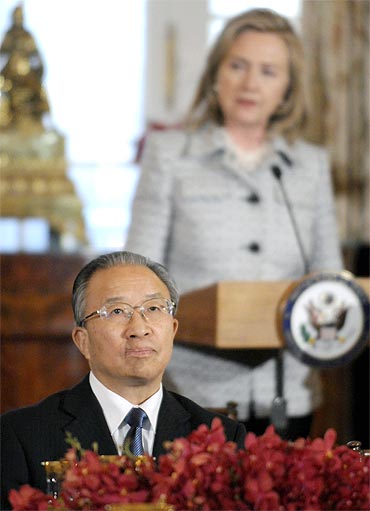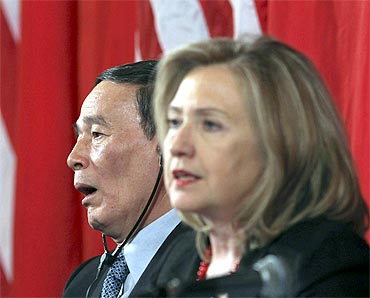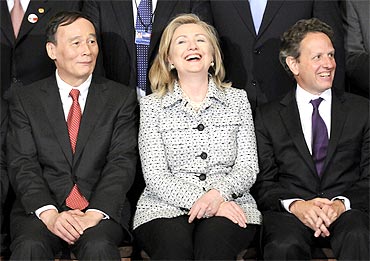 | « Back to article | Print this article |
The BIG spat: US 'scolds' China on human rights
The United States on Wednesday sharpened its criticism of China's human rights record, citing handling of restive Tibet region, triggering a strong retort from Beijing.
But the public spat by the two big nations did not affect the Pacific power summit in making headway to ease frictions over the economy during a two-day Strategic and Economic Dialogue that concluded in Washington.
As expected it was one of the major sticking point between the leaders of the two countries, in addition the US concerns on Chinese military modernisation and some of its economic policies.
Click NEXT to read further...
'China has a deplorable record'
In an interview, Secretary of State Hillary Clinton said that China has a "deplorable human rights record," while Chinese Vice Foreign Minister Zhang Zhijun asked the US to show caution in its handling of restive Tibet.
"We hope that the US side will keep its word on its commitments and cautiously and properly deal with Tibet-related issues," the Chinese leader said.
In the interview to the Atlantic magazine which was released on Wednesday, Clinton said China is right now scared by the developments in the Middle East.
Click NEXT to read further...
'Trying to stop history is a fool's errand'
"They're worried, and they are trying to stop history, which is a fool's errand. They cannot do it. But they're going to hold it off as long as possible," she said. However, Clinton asserted that the difference between the two countries on human rights issues does not hinder any way to hold talks.
She said the US side will raise questions about human rights, but "that doesn't prevent us from working on critical issues that will determine the quality of life that people lead."
"How do we keep our economies growing? If the United States and China don't cooperate, the world will suffer. How do we deal with climate change? How do we deal with energy?" she told the Phoenix TV in an interview.
Click NEXT to read further...
'We have to be honest about our differences'
"How do we deal with all of these issues food security, clean water which are critically important to the people that we both represent? So it's not either/or. It's a combination. It is, as both President Hu Jintao and President Obama said, we want a positive, cooperative, and comprehensive relationship," she said in the interview.
In her remarks to the closing session of the two-day strategic and economic dialogue, Clinton said the US believes that to keep their relationship on a positive path, as foreseen by the two presidents, the US and China have to be honest about their differences and address them firmly and forthrightly.
"At the same time, we are working together to expand the areas where we cooperate and narrow the areas where we diverge. And we are building up a lot more understanding and trust. So we discussed everything, and whether it was something that was sensitive to us or sensitive to them, all the difficult issues, including human rights," she said.
"We both have made our concerns very clear to the other. We had candid discussions on some of our most persistent challenges, from addressing North Korea and Iran to rebalancing the global economy," she said.



